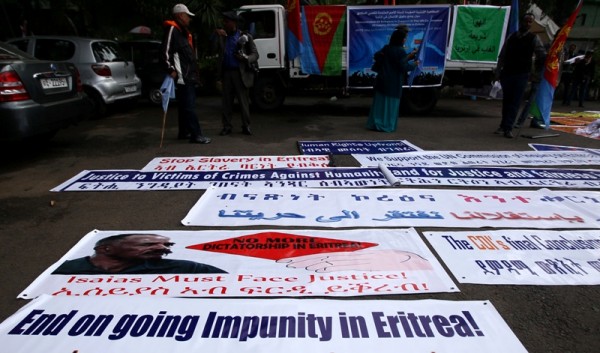The Eritrean government should abide by its own laws and release journalists who have been imprisoned for years without the benefit of a court hearing or legal representation, the International Press Institute said today.
In a letter to Eritrean President Isaias Afewerki, IPI also urged the Eritrean leader to publish the location and health status of all the imprisoned journalists, some of whom are feared dead or victims of torture. Since more than a dozen journalists were first jailed in a crackdown on independent media in 2001, IPI has repeatedly called for the government in Asmara to free the reporters and editors who have been confined in appalling conditions without access to their families or lawyers.
“The sinister detention of these journalists without due process in flagrant violation of Eritrea’s own laws has gone on too long’’, IPI Director David Dadge said. “The imprisoned journalists, along with numerous political opponents, are behind bars because President Afewerki doesn’t like independent thinkers and can’t take criticism. This affront to the rights of the Eritrean people must end.”
At least 18 journalists have been locked up apparently without access to visitors or medical care, and four are feared dead. They were rounded up in political crackdowns in September 2001 and November 2006 and detained without being charged.
It is impossible to verify the conditions of the prisoners because the government has barred outside inspectors from its prisons. Afewerki’s government has denied reports that some of the detained journalists have died in captivity.
According to IPI’s World Press Freedom Review 2008, the Eritrean government is one of the world’s most brutal suppressors of independent reporting and the leading jailer of journalists in Africa. Repression in the East African country has grown since it fought a brutal border war with Ethiopia from 1998 to 2000, a conflict that remains a source of tension today.
IPI has highlighted the plight of the imprisoned journalists in its Justice Denied campaign, and appealed to the Eritrean government in 2002 to end the unlawful detentions. In 2007, IPI lobbied the World Bank, European Commission and Britain’s aid agency to pressure the Eritrean government to free the journalists.
Today, IPI sent copies of its latest appeal to President Afewerki to two Swedish members of the European Parliament, Olle Schmidt and Eva-Britt Svensson, who supported a resolution approved last month urging the Eritrean government to publicly declare the whereabouts of imprisoned journalists, and either charge them and allow their cases to be heard in the courts, or release the detainees. Dawit Isaac, one of those detained in Eritrea and reportedly in deteriorating health, is a Swedish citizen.
In addition to Isaac, the jailed journalists include Mattewos Habteab, Dawit Habtemichael, Temesken Ghebreyesus, Emanuel Asrat, Seyoum Tsehaye, Hamid Mohammed Said, Saleh Al Jezaeeri (Al-Jezaeri), Fitzum Wedi Ade, Selamyinghes Beyene, Zemenfes Haile, Ghebrehiwet (Gebrehiwot) Keleta, Daniel Mussie, and Tura Kubaba.
Those feared dead are Fessehaye “Joshua” Yohannes, Said Abdulkader, Medhanie Haile and Yusuf Mohamed Ali. The Eritrean government denies that they have died in custody, but has not released any information as to their whereabouts.
For more information, contact:
Timothy Spence
Press and Communications Manager
Tel: +43 1 512 90 11
E-mail: tspence(at)freemedia.at

